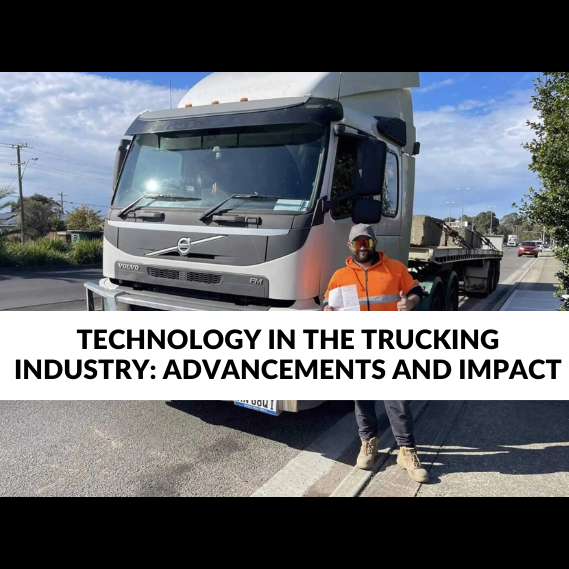INTRODUCTION:
In the recent era of technology in the trucking industry has seen incredible breakthroughs that have revolutionized global freight transportation. The cutting-edge new technology in trucking industry has greatly improved efficiency, safety, and sustainability towards creative solutions. This blog examines the newest technology developments and how they are significantly affecting the transportation sector. The extensive use of telecommunications and informatics technology in the trucking industry and transportation sector is one of the biggest advancements. Telecommunications and informatics offer real-time intuitions into vehicle recital, driver performance, and cargo status through the use of GPS tracking, onboard sensors, and data analytics.
This abundance of data technology in trucking can be used by fleet managers to plan routes more proficiently, use less fuel, and assurance on-time delivery. Moreover, preventative maintenance scheduling is made easier by telemetry systems technology in the trucking industry, which lowers the need for expensive repairs and helps to avoid breakdowns. The trucking sector is positioned for significant mayhem as technology in trucking advances, stimulating innovation and influencing the direction of freight transportation.
Technology in Trucking Industry: Lashing Modernization
The integration of diverse technology improvements aimed at enhancing operations and satisfying changing needs has resulted in extensive transformation of the technology in trucking industry. Telematics and self-directed cars are two major areas of technical innovation in the transportation industry.
- Telematics: Enhancing Vehicle Operational technology in trucking industry
The extensive use of telematics technology in the trucking industry is one noteworthy development. Telecommunications and informatics systems offer actual insights into vehicle performance, driver behavior, and cargo reliability through the use of GPS tracking, onboard sensors, and statistics analytics. Fleet managers can assure on-time delivery, enhance routes, and increase fuel efficiency by applying Telecommunications and informatics technology in trucking industry. These technologies also make anticipatory maintenance scheduling easier, which lowers the requirement for affluent repairs and helps to avoid malfunctions. Fleet managers may increase efficiency, improve operational competence, and make data-driven choices thanks to Telecommunications and informatics technology.
- Self-Driving Cars: Changing the Face of Freight Transportation technology in trucking
The expansion of autonomous technology in trucking industry is another area in which the transportation industry has witnessed significant innovation. Because autonomous trucking technology lowers employment costs, increases safety, and boosts operational efficiency, it has the potential to utterly transform freight transportation. Leading technology in trucking industry are creating and testing self-driving trucks. These trucks can navigate highways, identify obstructions, and make judgements in real time because of cultured sensors, cameras, and artificial intelligence algorithms. Even though the entirely autonomous trucks are still in the experimental stage, the new technology in trucking industry is developing quickly, which points to a future in which driverless cars will be heavily tangled in logistics procedures. The enactment of autonomous trucks has the potential to improve traffic safety, augment fuel efficiency, and enhance total freight transportation productivity.
Effect of New Technology in Trucking Industry:
- Upgraded Vehicle Management
The technology in trucking industry‘s fleet management procedures have been completely transformed by new technology in trucking industry, bringing in a new era of efficiency and optimization into the transportation sector. With the use of sophisticated tools and systems, fleet managers can now observe and control their vehicles more dexterously, which boosts operational efficiency and lowers costs.
Information Based on Data
Smart fleet management systems use telecommunications and informatics technology in the trucking industry and data analytics to give important information about fuel use, vehicle performance, and looking after requirements. Fleet administrators may decrease downtime and lift productivity by proactively scheduling repairs, elevating routes, and identifying inadequacies through data analysis.
Predictive Upkeep Techniques
A major advantage of recent fleet management technology in the trucking industry is the application of predictive maintenance algorithms. These algorithms use data from sensors attached in trucks to predict possible equipment problems before they happen. Fleet managers can prevent high failures and reduce delays to operations by proactively planning maintenance based on early issue identification.
- Enhanced Security for Drivers as new technology in the trucking industry
As technology in trucking is enhanced that it reduce accidents and protect drivers’ safety, new technology in trucking industry has greatly improved road safety. Modern safety technology has made it easier for drivers to assign difficult driving situations and stay aware of possible dangers.
Systems for Avoiding Collisions as the technology in trucking industry
The danger of accidents is shrank by progressive safety features including collision avoidance systems, This new technology in trucking use radar and sensors to identify possible crashes and notify drivers. These systems offer an extra point of safety on the road by spontaneously applying the brakes and adjusting the steering to help drivers avoid collisions.
- Warnings for Lane Departure new technology in the trucking industry
Lane departure warning technology in trucking industry aim to reduce accidents caused by driving distraction or sleepiness by alerting drivers when they unintentionally stray from their lane. These systems lower the chance of crashes with other cars by helping drivers stay focused and maintain proper lane location through the provision of timely warnings.
Sustainability of the Environment in Trucking Industry
The technology in trucking industry is adopting new ways to reduce its environmental impact and encourage sustainability in comeback of environmental concerns. The industry is looking into innovative ways to lower carbon emissions and reduce the impact on the environment in light of expansions in electric vehicles and alternative fuel sources.
Alternative Fuel Options as Technology in Trucking
Advances in biodiesel and natural gas as alternative fuels provide sustainable replacements to conventional diesel fuel that are a reduced amount of harm to the environment and release fewer greenhouse gases. Technology in trucking industry can lessen their environmental impression and meet ever-tougher emissions rules by switching to cleaner fuel sources.
New Technology in Trucking Industry of Electric Trucks
Improvements in battery technology and infrastructure are driving the rising acceptance of electric vehicles (EVs) as the new technology in trucking industry. Zero-emission transportation options provided by electric trucks contribute to the improvement of urban air quality and the reduction of greenhouse gas emissions. Electric vehicles will be a major part of freight transport industry in the future as long as battery technology advances and the infrastructure for charging them grows.
- Sustainable Practices in New Technology in Trucking Industry:
While addressing uncertainties about carbon emissions and the environment, new technology in trucking industry has also helped the transportation industry to adopt sustainable applies. The emergence of alternative fuel options, including trucks driven by hydrogen or electricity, provides a greener and more maintainable selection to conventional diesel engines. Furthermore, route optimizing algorithms and intelligent logistics solutions cut down on pointless travel distance and carbon emissions, fostering a more sustainable and environmentally friendly transportation system in trucking industry.
The technology in trucking industry has improved fleet management, driver safety, and environmental sustainability as a result of incorporating new technologies. The industry is advancing safety, efficiency, and sustainability in freight transportation by utilizing data-driven insights, cutting-edge safety features, and environmentally friendly solutions. The trucking industry is to be found to lead further innovation and breakthroughs in the transportation industry as a result of the ongoing evolution of technology in the trucking industry.
Technological Trends in Food Trucks
Food trucks provide a characteristic experience on wheels, making them an increasingly popular dining substitute. Food truck owners are using technology in trucking more and more to advance their businesses and attract clients in order to remain competitive in an overfilled market. Developments technological trends in food trucks industry sector, such as unified POS systems and smartphone apps, are changing how these mobile systems run and interact with their consumers.
- Applications for mobile devices in Technological Trends in Food Trucks
Food truck owners now dependent profoundly on mobile apps to stay in touch with their customers, handle orders, and monitor sales. Food truck holders can give customers a quick way to browse menus, make orders, and get information on their location and working hours by using a smartphone app. Food truck owners can also gather useful material about consumer tastes and behavior using mobile apps, which helps them adapt their menus and promotion campaigns.
- Platforms for Online Ordering in Technological Trends in Food Trucks
For the sake of improving efficiency in technological trends in food trucks and advance ordering process, a lot of food truck owners are using online ordering systems in addition to smartphone apps as new technology in trucking industry. Customers can submit orders ahead of time through multiple online ordering platforms, which reduces wait times and increases customer satisfaction. Moreover, these platforms can easily interface with point-of-sale (POS) systems, enabling food truck holders to maintain inventory and accomplish orders in real time.
- Mutual Point of Sale Systems
Food truck operators now considering integrated point-of-sale (POS) systems along with new technological trends in food trucks to be essential tools, as they make it simple for them to track sales, take expenses, and maintain inventory. Unconventional features including contactless payment alternatives, CRM skills, and inventory tracking tools are standard on contemporary point-of-sale (POS) systems. Food truck operators may give customers an all-in-one ordering and payment involvement by combining POS systems with multiple online ordering platforms and smartphone apps in new technology in trucking industry.
- Technology in Trucking as GPS Tracking and Direction Optimization:
These two innovative technologies in the trucking industry have completely changed the way of how food truck drivers plan their routes and set up their stops. Food truck owners are able to track customer demographics, identify high-traffic locations, and plan their routes for ideal effectiveness by using GPS-enabled smartphones and route optimization software. GPS tracking technologies in trucking reduces expedition time and fuel expenses, allowing food trucks to reach a wider audience and run more successfully.
- Social Media Existence and Marketing:
Social media sites are essential for food the innovation in technological trends in food trucks marketing and promotion. Operators use social media sites like Facebook, Instagram, and Twitter and other online public platforms to interact with patrons, provide information on their locations and menu opportunities, and cultivate a devoted following. Food truck businesses can raise brand awareness and spread awareness among new clients by keeping an active web presence and engaging with customers in real time.
- Customer Insights and Data Analytics:
Food truck operators can gain important insights into the performance, preferences, and purchase patterns of their customers by utilizing data analytics technological trends in food trucks. Operators can better serve their target demographic by adapting their menu options, valuing policies, and marketing campaigns by evaluating the information gathered from mobile applications, social media platforms, and point-of-sale systems. Truck owners using Technology in trucking may maximize their business growth and streamline their operations through data-driven decision-making.
- Modern Kitchen Automation Technology in Trucking:
The new technology in trucking industry developments have made it possible for food truck owners to increase productivity and improve their cooking procedures. These days, food trucks are prepared with cutting-edge equipment that improves food quality and consistency while reducing labor costs comparatively and wait times. Examples of this technology include automated food preparation systems, high-speed ovens, and induction cooktops.
Overall, the technology in trucking industry is changing as a result of technological trends advancements, which present different chances for development and innovation. Food truck owners are adopting technology to improve customer experience, optimize operations, and maintain competitiveness in a growing market. This includes features like mobile ordering, GPS monitoring, social media marketing, and data analytics. Through smart use of these technology in trucking industry developments, food trucks may keep growing and satisfying patrons.
FAQS:
1. What are some of the most significant developments in technology in trucking industry?
The trucking sector has benefited from major improvements technology in trucking from last several years. The creation of autonomous vehicles, the application of analytical maintenance methods, and the integration of telecommunication and informatics systems are a few noteworthy developments.
2. How does the technology in trucking industry‘s use of telemetry to enhance operations?
Telematics systems offer real-time insights on vehicle performance, driver performance, and cargo status through the use of onboard sensors and GPS tracking. Fleet managers can use telematics technology-provided data to enhance routes, improve fuel efficiency, and assure on-time deliveries.
3. What possible effects might autonomous trucks have on the movement of goods?
Because autonomous vehicles are safer, they are more efficient in their operations, and require less employment, they have the potential to completely transform the freight transportation industry. The technology of trucking in self-driving trucks is being spearheaded by many different businesses
4. How can truck drivers drive safer thanks to modern technology?
In order to reduce accidents and protect them from uncertainties safety, truck drivers and other road users, new safety features like fatigue detection sensors, lane departure alarms, and collision avoidance systems are executed. By using sensors and artificial intelligence algorithms, these cutting-edge safety systems can identify possible hazards and notify drivers in a timely manner.
6. In what ways are food trucks using technological trends in food trucks to enhance their business practices?
Technology is being used by food trucks to improve customer experience, increase efficiency, and reach new markets. This includes using integrated point-of-sale (POS) systems for smooth transactions, mobile apps for online ordering, and data analytics for menu optimisation and customer insights.
CONCLUSION:
In conclusion, innovation and the transformation of technology in trucking industry are being fueled by the trucking industry’s quick advancement. The transportation industry is continuing to grow and evolve due to ongoing advancements in telematics, autonomous vehicles, fleet management systems, and alternative fuel replacements. In the current period, truck firms must adopt these technological trends in food trucks industry and make use of new technologies in order to stay efficient, competitive, and long-lasting. Trucking firms may improve operations, lower costs, and gratify changing market needs by using innovative technologies like telematics for real-time monitoring, autonomous trucks for increased safety and efficiency, and alternative fuels for environmental sustainability. All things considered, the trucking sector may have a more productive, secure, and sustainable future as a result of using these new technologies in trucking industry.








